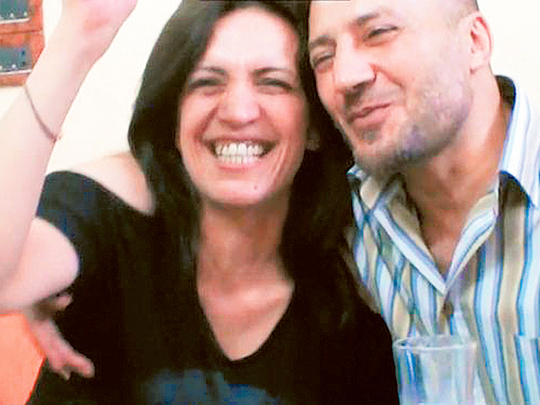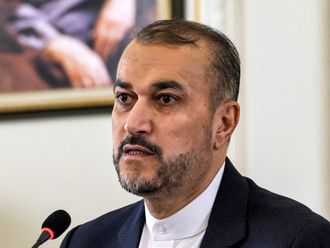
Filmed over a period of five years, this intimate and insightful documentary perfectly balances the personal and the political, telling its tale of national and international upheavals through their impact on individuals at the cutting edge of change. This is a profoundly moving account of two love stories: that between the film’s central couple, Amer and Raghda, who are torn apart by imprisonment and exile; the other being their love for Syria, which casts a long shadow over their lives, their marriage and their children. We first meet independent film-maker Sean McAllister in 2009, one of a group of journalists being shown around geology museums and heritage sites in Syria, an attempt to “sell the country as the next tourist hot spot”.
McAllister’s true focus, however, is political prisoners. In Damascus he meets Amer, who is bringing up his sons alone in Tartus while their mother languishes in prison. The couple met when both were behind bars, Palestinian-born Amer glimpsing the bruised and bloodied face of left-wing Syrian activist Raghda through a hole in a prison door. Their relationship blossomed upon release and their marriage produced beautiful sons. Then Raghda was arrested again, this time for the crime of writing a book critical of president Al Assad, leaving Amer to campaign for her release and to “wait for my wife, maybe five years, maybe more ...”
Hope springs in 2011 as a wave of protests pave the way for Raghda’s release, and McAllister is there to capture both the public demands and private reunions. But when the film-maker himself is picked up by Syrian security forces, the family is forced to flee to Lebanon, leaving Raghda feeling stateless and isolated (“I’m just a prisoner here”). Internationally recognised as political refugees, they are offered asylum in France, but only at the price of effectively abandoning both the land and the struggle upon which their relationship was first built.
Having earned himself a reputation as a film-maker willing to go the extra mile with 2004’s The Liberace of Baghdad and 2012’s The Reluctant Revolutionary, McAllister here conjures a mosaic of footage which can be variously read as hidden-camera investigation, socio-political treatise, fly-on-the-wall family drama, proto-feminist case study, and (most affectingly) child’s-eye view of adult trauma.
Over the course of the film’s five-year trajectory, we see sons Bob and Kaka grow up before our eyes, their young dreams turning to disaffection (“I hate revolution now,” says Kaka in Lebanon) as the cost of opposition takes its toll on their parents. “Those days were beautiful,” cries Bob, remembering “our sweet days” in Syria, but as time passes, his young identity changes — personal, emotional and national.
Not so Raghda, for whom Syria remains her first love. “I started before the revolution,” she says, “and cannot abandon it now”, a truth which leaves Amer increasingly confused and angered. “Get back to being a mother ... become a simple woman again,” he demands when his former soul mate proves disappointingly distant and depressed, the storm clouds of imprisonment still haunting her nightmares (“I can’t imagine what she went through,” says McAllister).
But beneath the trauma is something stronger — a devotion to Syria that transcends all boundaries, familial and maternal. Time and again, Raghda is drawn back towards her homeland and the unfinished business to which she remains committed whatever the personal cost.
Dropping in and out of the family’s peripatetic lives, McAllister documents their changing struggles as a strange mix of family friend and televisual confessor. At times his presence feels intrusive; one sequence in which Amer demands access to a laptop, which Raghda has hidden to cut off contact with his mistress, makes the viewer an uncomfortable witness to the painful airing of private laundry. Worse still is the children’s acute awareness of their parents’ problems — the dream of mum and dad being reunited crumbling in the reality of exile.
Yet through it all the bigger picture remains — the knowledge that all this interpersonal strife is the direct result of political oppression and (inter) national catastrophe. No matter how close he becomes to the family (“he’s not my uncle,” Bob is forced to explain at one point), McAllister somehow keeps our focus on the fact that this is all a microcosm of a more global crisis.
Deserving winner of the grand jury prize at the Sheffield Doc/Fest in August, A Syrian Love Story benefits from evocative use of music, including tracks from Le Trio Joubran, whose plucky contributions lend depth, tension and resonance to the unfolding drama. There is redemption here too, or at least the possibility of a better future, albeit distant.
“Many waves take me to strange places,” says Raghda, “but inside me still, I have this hope ... for humanity, for freedom, for my country.” In the midst of the current crisis, such hope is rare indeed.












